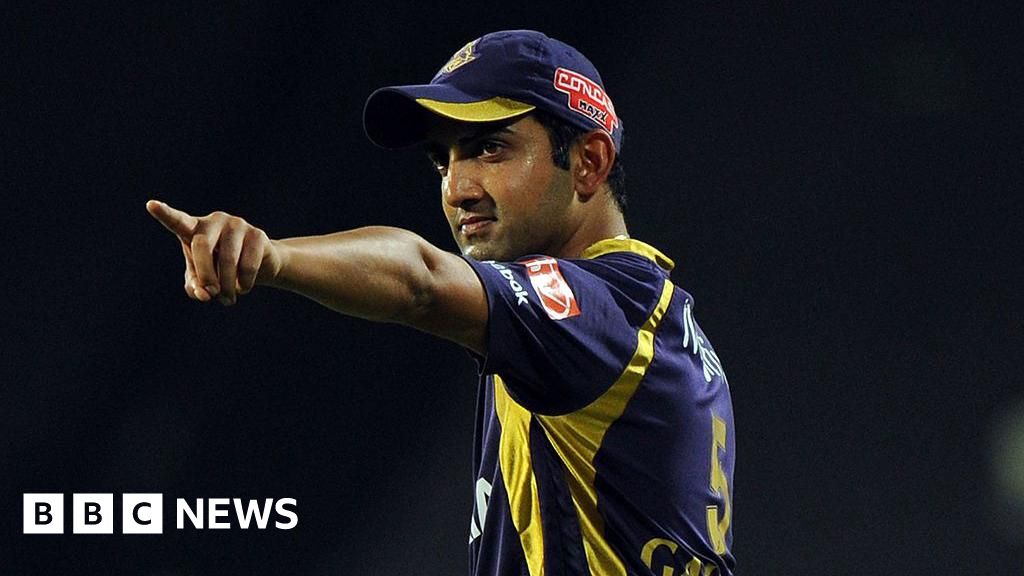Cricket
Gautam Gambhir: The new India cricket coach who doesn’t like ‘star culture’ – BBC News

- Author, Ayaz Memon
- Role, Cricket writer
At 42, Gautam Gambhir, is the youngest head coach in the history of the Indian cricket team.
He succeeds Rahul Dravid whose tenure finished with the recently concluded T20 World Cup.
Dravid declined an extension to spend more time with his family. VVS Laxman, his former batting partner, was initially favoured but opted to stay at the National Cricket Academy. This cleared the path for a new face, resulting in an uncontested selection.
Some unexpected developments in the past six-seven months had fast-tracked Gambhir’s candidature.
Last November, he unexpectedly resigned as mentor of IPL franchise Lucknow Super Giants after guiding them to the knockout stages in two previous seasons. Instead, he reunited with his former IPL team Kolkata Knight Riders (KKR), where he had previously led them to titles in 2012 and 2014 as a captain.
In March, Gambhir, who joined the ruling Bharatiya Janata Party (BJP) after retiring from cricket in 2018 and was elected MP for East Delhi in the 2019 general election, informed the BJP leadership of his decision to leave politics to fully dedicate himself to cricket once again.
However, his credentials to be head coach of the national team received tepid attention until KKR hit a purple patch winning several matches on the trot and turned the focus on him.
The process of selecting a chief coach is complex.
The Board of Control for Cricket in India (BCCI) announces a call for applications through the media, inviting candidates from India or abroad who meet specific eligibility criteria (like played 30 Tests or 50 ODIs, under 60 years old).
Applications are reviewed by the Board’s Advisory Committee (CAC). Shortlisted candidates are then invited for one-on-one interviews to present their vision for advancing Indian cricket.
Image source, Getty Images
The candidate who puts forward the most impressive strategies and processes is picked for the job.
In Gambhir’s case, the absence of any rival made the task of the CAC a no-brainer.
After the BCCI’s notice seeking applications for the post, stories about some overseas coaches being approached informally (likely self-instigated) began swirling around, but died a quick death.
Unlike in the past, when an overseas coach was sought to counter factionalism, favouritism, and parochialism in Indian cricket, today’s preference is for an Indian coach who better understands the country’s ethos, culture, and psychology.
Former India opener W Raman, who has coached the Indian women’s team, did express interest in taking up the assignment. His CV was impressive, but at 59, he perhaps sensed he didn’t have time on his side to build up a three-year game-plan that would get a buy-in from the BCCI and held back.
Gambhir was the sole applicant, and his successful mentorship of KKR to an IPL triumph made him the frontrunner. With Dravid’s firm stance during the T20 World Cup that he wouldn’t continue, Gambhir’s appointment became inevitable.
His appointment isn’t without merit though. Beyond his IPL success, he has impressive credentials as an India player. A stylish left-handed batsman, he debuted in 2003 and is one of India’s most accomplished openers with stellar performances across all formats.
For instance, in 2009, against New Zealand in the second Test at Napier, Gambhir batted 436 balls to score an epic 137 that helped India save the match after being forced to follow on. This knock helped India win the series.
Two years earlier, in the final of the inaugural T20 World Cup final against Pakistan, Gambhir was the top scorer with 75. Similarly, in the 2011 ODI World Cup final against Sri Lanka at the Wankhede Stadium, he top-scored with 97.
Feisty and blunt, Gambhir’s intense, unsmiling demeanour has often led critics to see him as unapproachable.
On his part, Gambhir claims he decries the focus on stars rather than star performances in Indian cricket. He believes the brand value of a few players shouldn’t overshadow the intrinsic betterment of Indian cricket.
The head coach of India is among the most coveted jobs in the sport, guaranteeing, apart from enormous prestige and power, a lip-smacking pay package in excess of $1m per year plus bonuses. But in a cricket-crazy country, this does not come without great burden of responsibility and humongous pressure of expectation.
For the next three years, India has a busy calendar – it will participate in the Champions Trophy this year, the World Test Championship next year, the T20 World Cup in 2026 and the ODI World Cup in 2027, along with bilateral assignments.
Gambhir must manage dressing room superstars, oversee generational transitions, and implement changes in mindset, strategies, and skills to maintain and enhance India’s position in cricket.
Being head coach is a prestigious role, but Gambhir has a formidable task ahead.


)






